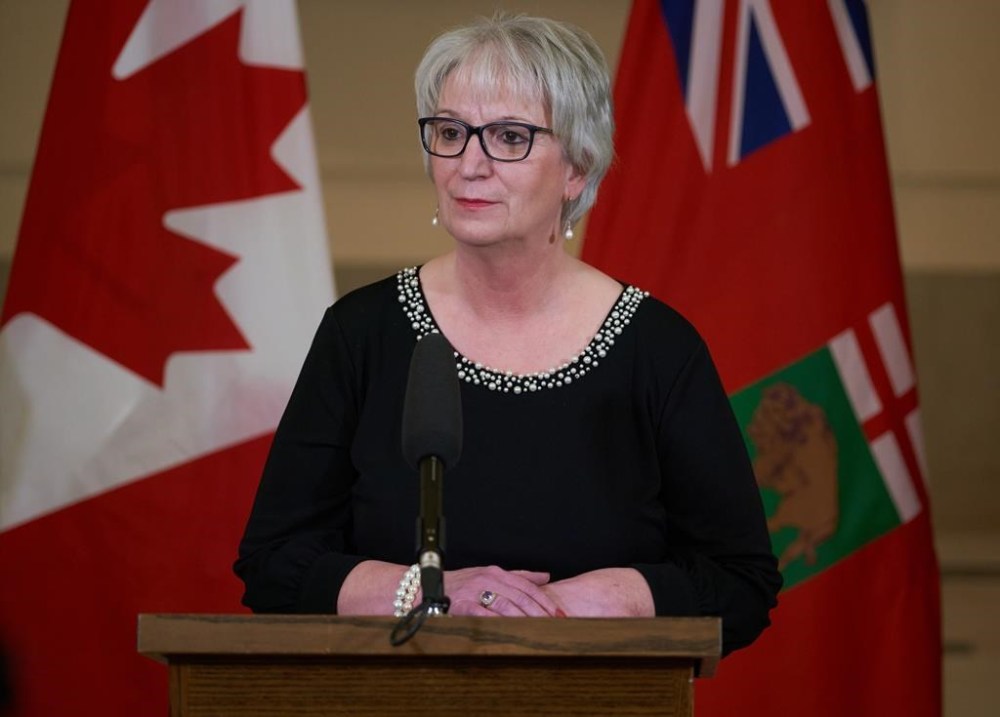Eileen Clarke, who quit cabinet over a Manitoba premier’s comments, plans to retire
Advertisement
Read this article for free:
or
Already have an account? Log in here »
To continue reading, please subscribe:
Monthly Digital Subscription
$19 $0 for the first 4 weeks*
- Enjoy unlimited reading on winnipegfreepress.com
- Read the E-Edition, our digital replica newspaper
- Access News Break, our award-winning app
- Play interactive puzzles
*No charge for four weeks then billed as $19 plus GST every four weeks. Offer only available to new and qualified returning subscribers. Cancel any time.
Read unlimited articles for free today:
or
Already have an account? Log in here »
Hey there, time traveller!
This article was published 20/08/2022 (857 days ago), so information in it may no longer be current.
WINNIPEG – A Manitoba politician who resigned from cabinet over controversial remarks by former premier Brian Pallister says she is planning to retire.
Eileen Clarke, 68, said Sunday she will serve out her term but will not seek re-election when the next vote — currently scheduled for Oct. 3 of next year — is held.
“It’s a very full life. I find most weeks, I work seven days a week, and there comes a time when one has to think about the future,” Clarke said.

“I just feel that I have to look at life from a different side other than full-scale work.”
Splitting time between her rural Agassiz constituency and her duties in Winnipeg has also been demanding, she added.
Clarke resigned from the Indigenous relations portfolio last year, days after Pallister made controversial remarks about Canadian history.
Pallister condemned the actions of demonstrators who had toppled two statues on the legislature grounds to protest the deaths of Indigenous children at residential schools.
Pallister said people who came to Canada, both before and after it was a country, did not come to destroy but to build communities, farms, businesses and churches. The comments were widely condemned as a defence of colonialism, which Pallister denied.
In an interview Sunday, Clarke said there were problems before that incident. Pallister did not listen to his ministers, Clarke said, and she felt unable to do what she thought was necessary in her portfolio.
“I was feeling a huge sense, a burden of guilt, for not being able to do better for the First Nations and Métis people of this province. They needed a voice and my voice wasn’t being heard.”
Clarke did not reveal details of her disagreement with Pallister but hinted at differences over the government’s policies toward Indigenous people.
“I had promised myself that I would not change who I was to be a politician, and I just found myself really feeling compromised — not by my hands but by the leadership.”
Clarke was brought back into cabinet in January of this year by Pallister’s successor, Heather Stefanson. This time, she was appointed to municipal relations — a natural fit for Clarke, who served as mayor of Gladstone, Man., for eight years before entering provincial politics in 2016.
Clarke has, on more than one occasion, made a point of saying Stefanson listened to her Progressive Conservative colleagues and other Manitobans.
Clarke is the second cabinet minister in recent months to announce a departure from politics. Scott Fielding resigned as natural resources minister in early June and left his legislature seat a short time later.
The Progressive Conservatives have seen their support in opinion polls drop since the fall of 2020. Stefanson has so far not prompted a reversal in the polls, and the Opposition New Democrats have been consistently registering above the Tories in Winnipeg, where most legislature seats are.
This report by The Canadian Press was first published Aug. 21, 2022.


